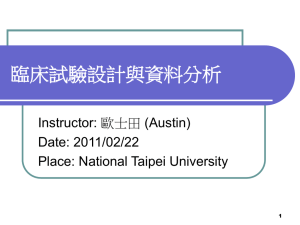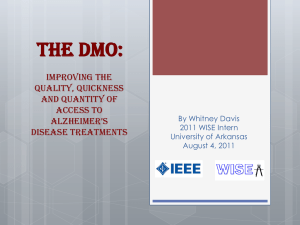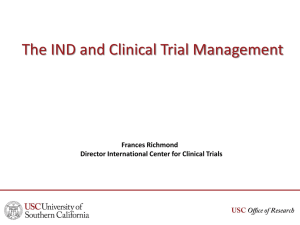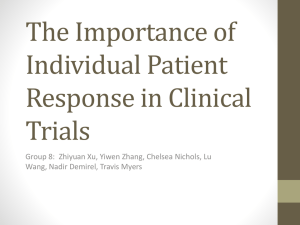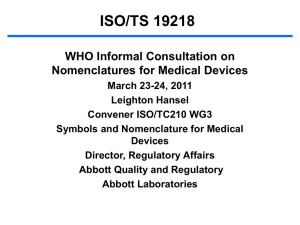Safety_data_collection_ASCO_letter
advertisement
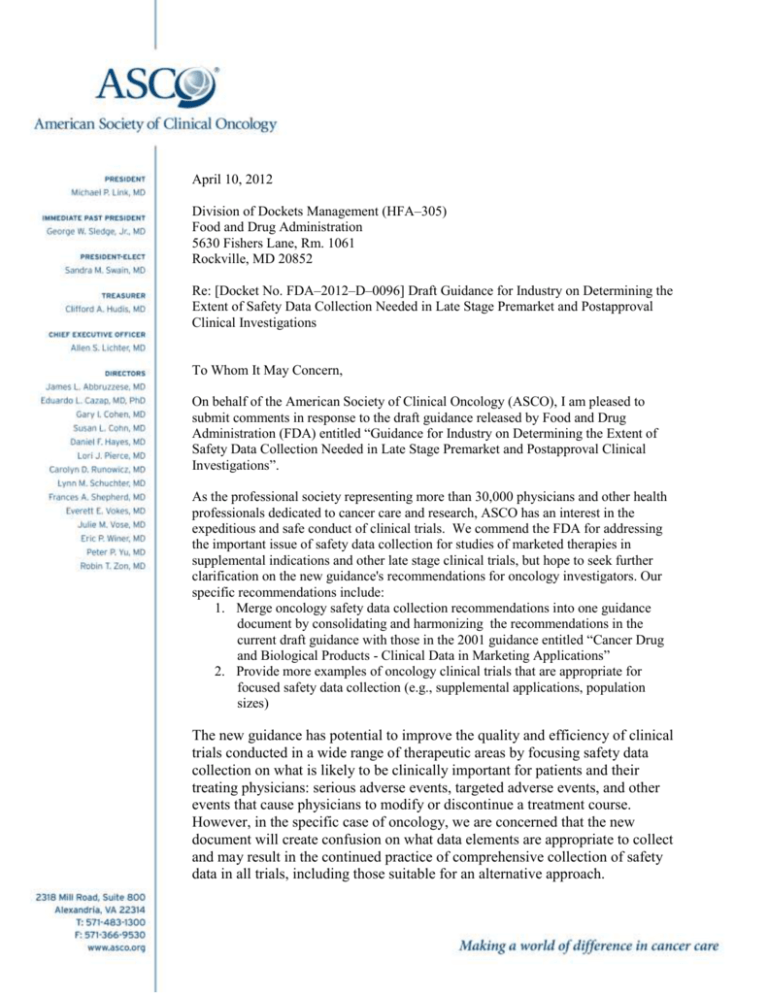
April 10, 2012 Division of Dockets Management (HFA–305) Food and Drug Administration 5630 Fishers Lane, Rm. 1061 Rockville, MD 20852 Re: [Docket No. FDA–2012–D–0096] Draft Guidance for Industry on Determining the Extent of Safety Data Collection Needed in Late Stage Premarket and Postapproval Clinical Investigations To Whom It May Concern, On behalf of the American Society of Clinical Oncology (ASCO), I am pleased to submit comments in response to the draft guidance released by Food and Drug Administration (FDA) entitled “Guidance for Industry on Determining the Extent of Safety Data Collection Needed in Late Stage Premarket and Postapproval Clinical Investigations”. As the professional society representing more than 30,000 physicians and other health professionals dedicated to cancer care and research, ASCO has an interest in the expeditious and safe conduct of clinical trials. We commend the FDA for addressing the important issue of safety data collection for studies of marketed therapies in supplemental indications and other late stage clinical trials, but hope to seek further clarification on the new guidance's recommendations for oncology investigators. Our specific recommendations include: 1. Merge oncology safety data collection recommendations into one guidance document by consolidating and harmonizing the recommendations in the current draft guidance with those in the 2001 guidance entitled “Cancer Drug and Biological Products - Clinical Data in Marketing Applications” 2. Provide more examples of oncology clinical trials that are appropriate for focused safety data collection (e.g., supplemental applications, population sizes) The new guidance has potential to improve the quality and efficiency of clinical trials conducted in a wide range of therapeutic areas by focusing safety data collection on what is likely to be clinically important for patients and their treating physicians: serious adverse events, targeted adverse events, and other events that cause physicians to modify or discontinue a treatment course. However, in the specific case of oncology, we are concerned that the new document will create confusion on what data elements are appropriate to collect and may result in the continued practice of comprehensive collection of safety data in all trials, including those suitable for an alternative approach. Docket Number: FDA-2012-D-0096 April 10, 2012 Page 2 of 3 Cause for Confusion In the introduction of the draft guidance, oncology investigators are directed to refer to the 2001 FDA guidance, “Cancer Drug and Biological Products - Clinical Data in Marketing Applications,” for specific instructions on safety data collection (line 26). The 2001 guidance lays out a thoughtful strategy for data collection in cancer clinical trials and contains elements in common with the new guidance regarding selective adverse event collection. However, the draft guidance also includes several oncology-specific recommendations that are not consistent with the 2001 guidance: 1. The 2001 cancer guidance does not provide specific recommendations concerning selective data collection in large outcome trials, while the draft guidance mentions this area as applicable to cancer recurrence studies (line 183). 2. In lines 301-311 of the draft guidance, the FDA states that cancer prevention and adjuvant therapy trials should be designed with comprehensive data collection plans with possibilities for collection of common, non-serious adverse events in a subset of patients. This is a valuable recommendation that is not addressed in the 2001 guidance. 3. In line 349 of the draft guidance, the FDA recommends collection of all Grade 3 and 4 adverse events in all studies in the new guidance, but the 2001 guidance posits that some trials may require these events to be collected comprehensively in only a subset of the total study population (sections III and IV). 4. The new guidance, as well as the FDA webinar held on March 27, 2012, seems to project a more conservative philosophy by the FDA on data collection in oncology than described in the 2001 guidance by focusing on exceptions to rather than appropriate applications of the new methodology in oncology.i We would appreciate clarification on these particular issues and specific examples of when the FDA is amenable to focused data collection approaches in oncology. Combining these recommendations into a single guidance would help reduce opportunities for confusion or misinterpretation. Prior to the release of the 2012 guidance, oncology investigators expressed confusion with FDA expectations for adverse event collection. In 2008, a panel of experts at a National Cancer Policy Forum meeting discussed discordance between data collection standards in National Cancer Institute Cooperative Group and industry-sponsored clinical trials.ii Similar concerns were voiced by panelists at the 2008 and 2009 Brookings Institution's Conference on Clinical Cancer Research.iii, iv The confusion will likely lead sponsors to continue to collect safety data comprehensively for all trials. Optimized Data Collection Study of Cancer Trials for Supplemental Drug Applications ASCO has given much consideration to the issue of data collection standards for cancer studies of marketed drugs in new settings and populations. In 2008, ASCO formed a working group of cancer clinical research stakeholders from academic institutions, publicly funded research organizations, industry, and patient advocacy to evaluate adverse event and concomitant medication data collection and reporting practices. The group reanalyzed data from eight previously published phase III clinical trials supporting supplemental applications and compared them to earlier studies of the same therapies with the intention of identifying optimized, or focused, approaches to safety data collection. The results, published in 2010 in the Journal of Clinical Oncology (JCO), found that a selective approach to adverse event collection was likely to identify safety signals in the supplemental application trials (see enclosed article).v Furthermore, the strategy demonstrated significant potential to save resources required Docket Number: FDA-2012-D-0096 April 10, 2012 Page 3 of 3 for data collection, validation, and reporting. These findings were consistent across a wide range of treatment types, regimens, research settings, and trial sizes. In the specific area of oncology supplemental applications, a more focused collection of safety data – including collection of all deaths, all serious adverse events, all dose modifying and discontinuation events, and adverse events of interest based on prior experience with the drug, drug combinations, and study population, as well as non-serious events in a subset of the population – is an option worth implementing by the FDA and sponsors. The approach outlined in the article is consistent with several recommendations made in both guidances. Additionally, our recommendations include specific criteria and statistical considerations for implementing a focused data collection approach in oncology. While comprehensive data collection is critical in many circumstances to developing fully-characterized drug safety profiles, selective safety data collection provides a safe, accurate, and efficient alternative in supplemental application cancer clinical trials. We hope that the FDA considers addressing the issues presented in this letter, the approach outlined in the JCO article, and combining the draft and 2001 guidances into one comprehensive document. This is an important topic to our members and we would be happy to meet to discuss our recommendations further. Please contact Cindi.Stephens@asco.org or 571.483.1635. Sincerely, Michael P. Link, MD ASCO President Enclosure (1) i Temple R, Ross Southworth M, Ibrahim A: FDA Webinar: New Draft Guidance on Safety Data Collection. Webcast on March 27, 2012 ii Doroshow J, Fyfe G, Comis R: Session 3: Data collection standards to establish safety and efficacy. Presented at the National Cancer Policy Forum Workshop on Multi-site Clinical Trials and the National Cancer Institute Cooperative Group Pro- gram, Washington, DC, July 1-2, 2008 iii Schilsky R, Abrams J, Fyfe G, et al: Panel 1: Data submission standards and evidence requirements. Presented at the 2008 Conference on Clin Cancer Res, hosted by the Engelberg Center for Health Care Reform and Friends of Cancer Res, Washington, DC, September 26, 2008 iv Schilsky R, Fyfe G, Abrams J, et al: Panel 1: Data submission standards and evidence requirements. Presented at the Engelberg Center for Health Care Reform and Friends of Cancer Res 2009 Conference on Clin Cancer Res, Washington, DC, September 14, 2009 v Kaiser LD, Melemed AS, Preston AJ, et al. (2010) Optimizing collection of adverse event data in cancer clinical trials supporting supplemental indications. J Clin Oncol 28:5046–5053.

